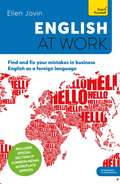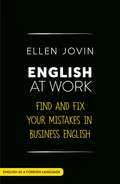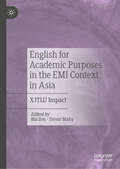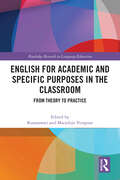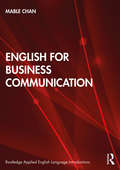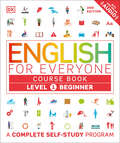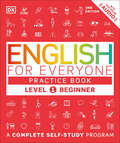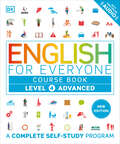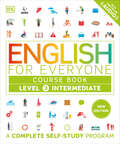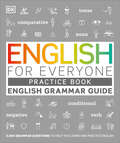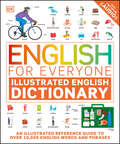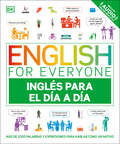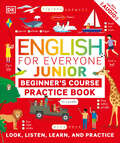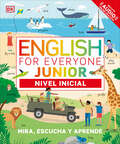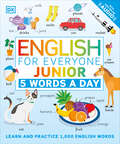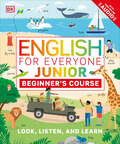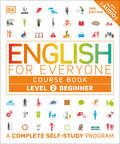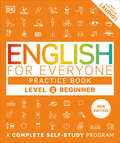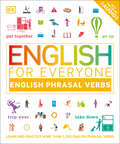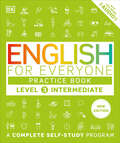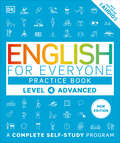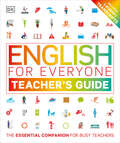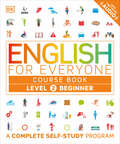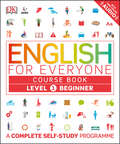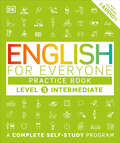- Table View
- List View
English at Work: Find and Fix your Mistakes in Business English as a Foreign Language
by Ellen JovinThis Grammar Guru will solve the world's problems. Or, at least, help you figure out when to use an Oxford comma. - The New York TimesPut your English skills to work for you! This book is ideal for intermediate and advanced (CEFR B1-C1) nonnative speakers of English seeking to increase their communication confidence and effectiveness in the workplace. Improve your precision and professionalism so your ideas shine!The book consists of 50 short quizzes which include the most common English errors made by nonnative speakers in professional environments. This fun format allows you to find your own frequent errors and fix them. You will test your skills quickly, daily, and build your language awareness and accuracy in writing and speaking English. Short, clear explanations after each quiz help you improve your knowledge of the grammar rules. Complementing the quizzes are Ellen says boxes with the same practical advice on good communication etiquette and habits that Ellen has been sharing for years with large corporate clients in New York City and beyond. Witty and humorous drawings illustrate confusing language and common misunderstandings. The focus of the exercises is on fixing your grammar and word-choice problems. Examples are pulled from every industry: finance, law, consulting, publishing, real-estate, retail, technology, energy, pharmaceutical, manufacturing, education, advertising, government, insurance, non-profit, and more. Whatever your profession or interest, you will benefit from the exercises contained in this book. If you are just looking to sharpen your English, this book is for you, too.This India-specific edition includes a special section of the most common English errors made in the Indian workplace and their standard equivalents, as well as a downloadable reference guide of frequently confused and misused words and expressions.You will be learning from a professional writer with two decades of experience teaching executives in a business setting. A language-learner herself who has studied some two dozen languages, Ellen Jovin has written this book to help motivated working adults advance their business English on their own time and at their own pace.
English at Work: Find and Fix your Mistakes in Business English as a Foreign Language
by Ellen JovinThis Grammar Guru will solve the world's problems. Or, at least, help you figure out when to use an Oxford comma. The New York TimesPut your English skills to work for you! This book is ideal for intermediate and advanced (CEFR B1-C1) nonnative speakers of English seeking to increase their communication confidence and effectiveness in the workplace. Improve your precision and professionalism so your ideas shine!The book consists of 50 short quizzes which include the most common English errors made by nonnative speakers in professional environments. This fun format allows you to find your own frequent errors and fix them. You will test your skills quickly, daily, and build your language awareness and accuracy in writing and speaking English. Short, clear explanations after each quiz help you improve your knowledge of the grammar rules. Complementing the quizzes are Ellen says boxes with the same practical advice on good communication etiquette and habits that Ellen has been sharing for years with large corporate clients in New York City and beyond. Witty and humorous drawings illustrate confusing language and common misunderstandings. The focus of the exercises is on fixing your grammar and problems with word choice. Examples are pulled from every industry: finance, law, consulting, publishing, real-estate, retail, technology, energy, pharmaceutical, manufacturing, education, advertising, government, insurance, non-profit, and more. Whatever your profession or interest, you will benefit from the exercises contained in this book. If you are just looking to sharpen your English, this book is for you, too.You will be learning from a professional writer with two decades of experience teaching executives in a business setting. A language-learner herself who has studied some two dozen languages, Ellen Jovin has written this book to help motivated working adults advance their business English on their own time and at their own pace.Note that this book reflects global English usage, but spelling is American English.
English for Academic Purposes in the EMI Context in Asia: XJTLU Impact
by Bin Zou Trevor MahyThis edited book focuses on English for Academic Purposes (EAP) within the English as a Medium of Instruction (EMI) context in Asia, with a specific emphasis on the impact of EAP at Xi'an Jiaotong-Liverpool University (XJTLU) in China. Celebrating over 15 years of EAP provision at the university, the authors showcase research and best practices in EAP across various academic disciplines and address the growing need for tailored EAP teaching resources in the EMI environment. The volume presents evidence of XJTLU’s dedication to pedagogical innovations and to the professional development of its teaching staff, and includes studies of EAP pedagogies at undergraduate, taught Master’s, and doctoral levels, with diverse instructional and innovative foci. This book will be of interest to teachers, researchers, postgraduate students, and university policy makers, as well as anyone with a background in English for Academic Purposes (EAP) or English as a foreign language (EFL) teaching.
English for Academic and Specific Purposes in the Classroom: From Theory to Practice (Routledge Research in Language Education)
by Rosmawati Marjolijn VerspoorThis volume showcases curriculum designs, instructional strategies, classroom challenges, and assessment practices in courses around the world introduced to meet the demand for English language skills for academic (EAP) or specific purposes (ESP) in higher education settings. Particularly in English as a medium of instruction (EMI) institutions, the courses are frequently part of the curriculum, regardless of discipline or specialization. Given the prevalence of such courses, it is important to understand how they are implemented.Many theories and models have inspired and underpinned these courses, including genre-based instruction, Writing in the Disciplines, Systemic Functional Linguistics, the academic literacies model, and translanguaging. Often, these are combined with various pedagogical approaches such as constructive alignment, flipped learning, learning-oriented assessment, Galperin’s theory of Systematic Formation of Mental Actions (SFMA), the study skills models, pedagogical cultural-historical activity theory, and the TESOL teaching-learning cycle. This book showcases how these are implemented in EAP/ESP classrooms.This volume gives a voice to instructors whose experience in real-life classrooms is invaluable to inform research and policies as well as to refine theories. It serves as a venue for conversation among the community of practitioners and researchers of applied linguistics and language teaching.
English for Business Communication (Routledge Applied English Language Introductions)
by Mable ChanThis textbook provides a comprehensive introduction for students and professionals who are studying English for business or workplace communication and covers both spoken and written English. Based on up-to-date research in business communication and incorporating an international range of real-world authentic texts, this book deals with the realities of communication in business today. Key features of this book include: use of English in social media that reflects recent trends in business communication; coverage of the concept of communicative competence; analysis of email communication; introduction to informal English and English for socialisation as well as goodwill messages, such as thank you or appreciation messages, which are a part of everyday interaction in the workplace; examination of persuasive messages and ways to understand such messages; an e-resources website that includes authentic examples of different workplace genres and a reference section covering relevant research studies and weblinks for readers to better understand the topics covered in each chapter. This book goes beyond the traditional coverage of business English to provide a broad and practical textbook for those studying English in a workplace setting.
English for Everyone - Level 1 Beginner's Course Book (DK English for Everyone)
by DKPLEASE NOTE - this is a replica of the print book and you will need paper and a pencil to complete the exercises.This essential guide to English will ensure you're speaking the same language in no time.Get started with the ultimate self-study course that is easy to use and quick to learn. This beginner's book guarantees an engaging and entertaining experience for adults learning English as a foreign language.From introducing yourself and talking about your life and interests to expanding your vocabulary and understanding grammar rules, this is a completely comprehensive introduction to the English language. A range of listening, speaking, reading, and writing exercises are presented in a simple, fluid format with an attractive visual style and accessible text. As you grow in confidence, you'll soon be moving through the levels to reach advanced English.This book is part of DK's best-selling English for Everyone series, which is suitable for all levels of English language learners and provides the perfect reading companion for study, exams (including TOEFL and IELTS), work, or travel. With audio material available on the accompanying English For Everyone website and Android/iOS apps bringing vital experience of spoken English, there has never been a better time to learn the world's second most popular language.
English for Everyone - Level 1 Beginner's Practice Book (DK English for Everyone)
by DKPLEASE NOTE - this is a replica of the print book and you will need paper and a pencil to complete the exercises.Practice makes perfect with this exciting guide to learning English.Work your way up with the ultimate self-study course that is easy to use and quick to learn. This practice book is perfect for anyone just starting to learn English, as well as those with a little English knowledge. It has a huge variety of bite-size, attractively presented exercises to drill the language skills taught in English for Everyone Course Book: Level 1 Beginner. Hundreds of activities and accompanying audio cover listening, speaking, reading, and writing to reinforce language skills.You'll expand your English vocabulary with topics like introducing yourself, your job, and hobbies and interests. Get to grips with grammar rules, including using apostrophes and linking sentences, and perfect your pronunciation with audio exercises by native speakers. Eye-catching illustrations and step-by-step explanations keep content simple and straightforward for easy learning.English for Everyone Level 1Beginner's Practice Book is part of DK's best-selling English for Everyone series. It is suitable for all levels of English-language learners and provides the perfect reading companion for study, exams, work, or travel. With audio material available on the accompanying website and Android/iOS app, there has never been a better time to learn English.
English for Everyone Course Book Level 4 Advanced: A Complete Self-Study Program (DK English for Everyone)
by DKTake your self-study English language learning a step further with the fourth book in the easy-to-use, visual learning series.English for Everyone Level Course Book Level 4 Advanced is a complete self-study English language course for intermediate learners. The content is more challenging at this level, covering subjects such as family life, business, news, and media.This advanced course targets experienced English speakers looking to sharpen their existing skills. English is taught at the highest level by reinforcing key language skills, grammar rules, and vocabulary with listening, speaking, reading and writing exercises. Extensive audio materials support all teaching, with clips recorded by native English speakers to teach the perfect pronunciation.Immerse yourself in this practical ESL learning material, which includes: A new and updated edition from the bestselling English for Everyone series, with nearly 3 million copies sold in over 90 countries.A brand new 8-page grammar reference section to put new language into practice.Extensive accompanying audio resources that can be accessed via the website and the app. This book is part of DK's best-selling English for Everyone series, which is suitable for all levels of English language learners and provides the perfect reading companion for study, exams, work, or travel. As you work through the units, you'll cover all the language skills, vocabulary, and grammar needed for the major global English-language exams, including TOEFL and IELTS.
English for Everyone Course Book Level 3 Intermediate (DK English for Everyone)
by DKTake your self-study English language learning a step further with the third book in the easy-to-use, visual learning series.English for Everyone Level Course Book Level 3 Intermediate is a complete self-study English language course for intermediate learners. It introduces topics such as telling a story, describing new experiences, relationships, and problem-solving.This course book has eye-catching illustrations and step-by-step explanations, keeping content straightforward for easy learning. Packed with listening, speaking, reading, and writing exercises presented in bite-sized modules, you can follow the book from start to finish or dip in and out to boost your language skills. All teaching is supported by extensive audio materials, with clips recorded by native English speakers to teach the perfect pronunciation.Immerse yourself in this practical ESL learning material, which includes: A new and updated edition from the bestselling English for Everyone series, with nearly 3 million copies sold in over 90 countries.A brand new 8-page grammar reference section to put new language into practice.Extensive accompanying audio resources that can be accessed via the website and the app. This book is part of DK's best-selling English for Everyone series, which is suitable for all levels of English language learners and provides the perfect reading companion for study, exams, work, or travel. As you work through the units, you'll cover all the language skills, vocabulary, and grammar needed for the major global English-language exams, including TOEFL and IELTS.
English for Everyone Grammar Guide Practice Book (DK English for Everyone)
by DKPuzzled by past tenses? Confused be comparatives? The English for Everyone Grammar Practice Book is packed with practice questions and activities to help you learn essential English grammar through visual and engaging content. The Grammar Practice Book helps you to develop your practical English through a variety of exercises and examples that will expand your understanding of grammar and punctuation in use. When used alongside our Grammar Guide, which introduces essential grammar rules through visual teaching methods, this grammar book is ideal for English test preparations or ESL lesson plans. About English For EveryoneEnglish for Everyone is a series of guides and practice books that support English learning for teenagers and adults from a beginner level, to intermediate, and advanced practical English. Offering an easy-to-follow format that offers guidance for both teaching English as a foreign language, and a self-study approach with resources available to improve English speaking, reading, and writing.Whether you are looking for ESL teaching resources, or a structured program for adults to learn English as a second language, the English for Everyone Series provides: - Sample language examples: New language topics are introduced in context using clear, illustrated, and color-coded explanations- Supporting audio: Extensive English-speaking audio materials integrated into every unit, giving vital oral and listening practice. (All supplementary audio is available on the DK English for Everyone website and IOS/Android App).- Quick referencing: Easy-to-follow units, mirrored in both the Course and Practice Books for easy referencing and teaching- Sentence formation guides: Visual break downs of essential English grammar for beginners, showing learners how to recreate even complex English sentences- Visual English vocabulary cues: Lists of useful English words and common phrases with visual aids are available throughout the book- Personalised learning: Write-on lines encourage ESL learners to write their prompts and translations The English for Everyone Series covers the skills and topics required for all major global English-language exams and reference frameworks including: - CEFR- TOEFL- IELTS- TOEIC
English for Everyone Illustrated English Dictionary (DK English for Everyone)
by DKLearn more than 10,000 of the most useful words and phrases in English with this beautifully illustrated dictionary for English-language students.Building on the success of the English for Everyone program and DK&’s Bilingual Visual Dictionary series, English for Everyone: Illustrated English Dictionary uses crystal-clear illustrations to show the meaning of over 10,000 words of English vocabulary. The words are shown in a visual context in themed sections covering practical or everyday topics (such as shopping, food, or study), providing learners with all the vocabulary they need for work, travel, and leisure.Learning English vocabulary is even easier with this visually stunning dictionary.
English for Everyone Inglés para el día a día (DK English for Everyone)
by DK¡Lleva tus habilidades de comunicación en inglés a otro nivel! Si necesitas aprender inglés para trabajar, estudiar, viajar o incluso mudarte, este libro será tu mayor aliado.English for Everyone: Everyday English te ayuda a expresarte en inglés en tu día a día con confianza. Aprende a comunicarte en diferentes escenarios del mundo real, desde actividades como ir al supermercado, pedir comida a domicilio o concertar citas, hasta conversaciones clave como consolar a alguien o lidiar con un conflicto.En las páginas de este libro de inglés para jóvenes y adultos, encontrarás: Más de 1500 frases y expresiones útiles para practicar tu inglés.Cada unidad incluye diálogos realistas y fáciles de memorizar.Ejercicios prácticos para reforzar el vocabulario y las frases que has aprendido en cada tema.Atractivas imágenes que acompañan los diferentes diálogos.Vídeos y audios de hablantes de inglés nativos, disponibles en nuestra página web y aplicación gratuitas.Una excelente herramienta de apoyo tanto para estudiantes que están preparando sus exámenes oficiales TOEFL, IELTS y TOEIC, como para viajeros o profesores. Mejora tu inglés oral de forma amena y divertida y enfréntate a situaciones cotidianas, como charlas en la oficina o reservas de viajes, más fácilmente. La colección English for Everyone de DK es una forma fácil y divertida de aprender inglés. Con audios de apoyo e innovadores ejercicios que cubren todos los aspectos clave del idioma, estos libros ilustrados sustituyen complicadas explicaciones por imágenes y gráficos claros, para aprender visualmente y que la gramática y el vocabulario resulten fáciles de recordar. ¡Aprender inglés no ha sido nunca tan fácil!Speak English with confidence in a wide range of everyday situations, from making small talk to booking a trip abroad. With more than 1,500 of the most useful phrases and common expressions, English for Everyone: Everyday English gives you all the English conversation skills you need to get by in the real world.This engaging and accessible book covers a wide range of real-life topics and scenarios – from everyday activities, such as going to the supermarket and making appointments, to key communication skills, such as comforting someone and dealing with conflict. You’ll learn how to welcome visitors, ask for directions, give a presentation at work, find somewhere to live, order a meal out, and much, much more.Each short unit uses memorable, true-to-life dialogues to introduce a new topic, followed by practice exercises to reinforce the new words and phrases that you have learned. The dialogues are accompanied by attractive illustrations and brought to life by animated videos and audio featuring speakers of English as a first language, all available on the free English for Everyone website and app. Whether you need to learn English for work, study, travel, or relocation, English for Everyone: Everyday English is the perfect companion to help you take your English skills to the next level.
English for Everyone Junior Beginner's Course Practice Book (DK English for Everyone Junior)
by DKA visually stimulating practice book to accompany English for Everyone Junior: Beginner's CourseEnglish for Everyone Junior: Beginner's Practice Book is a clearly structured and beautifully illustrated workbook for children ages 6-9, which offers extra practice for those beginning their journey of learning English as a foreign language. Following the same unit-by-unit structure as English for Everyone Junior: Beginner's Course, this workbook provides your child with all the support they need to build their confidence when using the language skills they have learned in the course book. Featuring hundreds of exercises, this practice book tests all the vocabulary and grammar structures taught within English for Everyone Junior: Beginner's Course, making use of a range of both familiar and new exercise mechanisms.Although best used to accompany English for Everyone Junior: Beginner's Course, this practice book can also be used independently by children or teachers who are in need of additional beginner-level English practice exercises. English for Everyone Junior: Beginner's Practice Book's dynamic visual approach to language learning makes it stand out from the competition.
English for Everyone Junior Nivel inicial (DK English for Everyone Junior)
by DK¡Mira, escucha y aprende inglés con este divertido libro para principiantes! Con English for Everyone Junior: Nivel inicial, ¡no necesitas tener conocimientos previos de inglés para empezar a dominar el idioma! Este libro para niños de 6 a 10 años se convertirá en el compañero ideal de tus hijos para aprender inglés, con gramática y vocabulario de temas esenciales como la familia, el colegio, los animales, la casa, el cuerpo humano, la comida, la ropa ¡y mucho más! Repleto de ejercicios sencillos y audios que te permitirán hablar y leer más de 500 palabras en tiempo récord.Perfecto tanto para estudiar en casa como en el colegio.Con explicaciones de reglas gramaticales inglesas acompañadas de ejemplos claros de cuándo se usan.Incluye una guía de escritura a mano y un glosario de los términos lingüísticos utilizados a lo largo del libro.Un recurso ideal que te proporcionará todo el apoyo que necesitas para aprender inglés desde cero, ya que te guía por los conceptos básicos del idioma y te ayuda a usar y comprender el inglés básico con claridad y confianza.La colección English for Everyone de DK es una forma fácil y divertida de aprender inglés. Con audios de apoyo e innovadores ejercicios que cubren todos los aspectos clave del idioma, estos libros ilustrados reemplazan las complicadas y aburridas explicaciones con imágenes divertidas y gráficos claros, para aprender visualmente y que la gramática y el vocabulario resulten fáciles de recordar. ¡Aprender inglés no ha sido nunca tan fácil!Learn English with this fun course for complete beginners. Simple exercises and lively audio will have you speaking and reading more than 500 words in no time!The perfect introduction to English vocabulary and grammar, English for Everyone Junior: Beginner's Course provides children aged 6-9 with the support they need as they take the first steps towards learning English as a foreign language.Equally effective for home study or the classroom, this carefully leveled English-language course assumes no previous knowledge of English. It takes children through the basics of the language, helping them use and understand elementary English clearly and confidently.Vocabulary is taught through attractive illustrations and reinforced with audio resources. Each language/grammar point is explained in a dedicated panel, accompanied by clear examples of how it's used, and reinforced by exercises. At the back, there is a handwriting guide, grammar overview, and a glossary of language terms used throughout the book.Building on the worldwide success of the English for Everyone series, the Junior Beginner's Course contains everything a child needs to acquire a firm grasp of English in a fun and interactive way.
English for Everyone Junior: 5 Words a Day (DK 5-Words a Day)
by DKThis beautifully illustrated vocabulary book for children introduces your child to the essentials of English vocabularyDiscover the perfect introduction to English for children aged 6-9 with this fantastic guide to English, which teaches and tests five new words each day, for five days a week, over one year. This language study guide contains everything a child needs to acquire a firm grasp of English in a fun and interactive way and... • Teaches over 1,000 commonly used English words • Beautiful illustrations accompany stimulating and entertaining activities • Follows the same visual methodology as the rest of the English for Everyone series • Structured in clear sections based around a theme (e.g. toys, food and drink, school) From colors, numbers, fruits, and toys to animals, sports, clothes, and weather, just about every subject in the English language is covered in eye-catching, illustrative detail. Incredibly easy to use, it includes daily &“test yourself&” activities with cleverly designed flaps that hide the words your child has just learned and helps fix those words in their memory. 5 New Words a DayThis unique study aid encourages parents, teachers, and children to work together as a team to grasp all aspects of the English language, including grammar, punctuation, and spelling. It&’s suitable as a workbook for children preparing for the Cambridge English and Trinity GESE exams. It&’s also a great English teaching resource for anyone teaching English lessons for kids. Packed full of fun and useful everyday vocabulary, this visual reference book will capture the imagination of little learners and encourage a love for learning their first English words. The book presents your child with 5 new words to learn and practice each day for four days, then tests these words through a variety of interactive exercises on day five. Over the course of one year, your child will build up a vocabulary of more than 1000 English words.Complete the Series:The English for Everyone series is a wonderful study guide for children to take their first steps towards learning English as a foreign language. Practice phrasal verbs and understand their meanings in English For Everyone: Phrasal Verbs.
English for Everyone Junior: Beginner's Course (DK English for Everyone Junior)
by DKLearn English with this fun course for complete beginners. Simple exercises and lively audio will have you speaking and reading more than 500 words in no time! PLEASE NOTE - this is a replica of the print book and you will need paper and a pen or pencil to complete the exercises.The perfect introduction to English vocabulary and grammar, English for Everyone Junior: Beginner's Course provides children aged 6-9 with the support they need as they take the first steps towards learning English as a foreign language.Equally effective for home study or the classroom, this carefully leveled English-language course assumes no previous knowledge of English. It takes children through the basics of the language, helping them use and understand elementary English clearly and confidently.Vocabulary is taught through attractive illustrations and reinforced with audio resources. Each language/grammar point is explained in a dedicated panel, accompanied by clear examples of how it's used, and reinforced by exercises. At the back, there is a handwriting guide, grammar overview, and a glossary of language terms used throughout the book.Building on the worldwide success of the English for Everyone series, the Junior Beginner's Course contains everything a child needs to acquire a firm grasp of English in a fun and interactive way.
English for Everyone Level 2 Beginner's Course (DK English for Everyone)
by DKThis essential guide to English will ensure you're speaking the same language in no time.Work your way up with the ultimate self-study course that is easy to use and quick to learn. The Level 2 beginner's book guarantees an engaging and entertaining experience for adults learning English as a foreign language.Budding beginners who already know the basics of English, this one is for you. Moving on from Level 1, this brilliant book goes into more depth and detail, including talking about yourself and your feelings, routines, choices, past events, future plans, achievements, and ambitions. Eye-catching illustrations and step-by-step explanations keep content simple and straightforward for easy learning. Packed with listening, speaking, reading, and writing exercises presented in bite-size modules, you can follow the book from start to finish or dip in and out to boost your language skills, expand your vocabulary, and get to grips with grammar.Level 2 builds your confidence and knowledge on the way to advanced English. English for Everyone Level 2 Beginner's Course covers the major global English-language exams, including TOEFL and IELTS.This book is part of DK's best-selling English for Everyone series, which is suitable for all levels of English language learners and provides the perfect reading companion for study, exams (including TOEFL and IELTS), work, or travel. With audio material available on the accompanying English For Everyone website and Android/iOS apps bringing vital experience of spoken English, there has never been a better time to learn the world's second most popular language.
English for Everyone Level 2 Beginner's Practice Book (DK English for Everyone)
by DKYou've learned the basics of the English language, now improve your confidence with the second practice book in the visual learning series English for Everyone.English for Everyone Level 2 Beginner's Practice Book will help you feel confident in the skills you learn from the Level 2 Beginner Course Book or from your other courses or studies. Strengthen your vocabulary and grammar skills on topics such as emotions, actions and activities, numbers, dates, months and seasons, and much more.Grab your pen and work your way through the exercises as you cover each Level 2 topic. Activities include filling in the blanks, true or false decision-making, matching the pairs, word searches, and more. Audio material is provided at every stage through the English For Everyone website and Android/iOS apps to help you perfect your pronunciation.English for Everyone is aligned to the CEFR, the international standard for language learning, and ideal for preparation for major English-language exams including IELTS, TOEIC, and TOEFL. Whether you want to improve your English for work, study, or travel, the Level 2 Beginner's Practice Book will help you gain confidence in your new English language skills.
English for Everyone Phrasal Verbs (DK English for Everyone)
by DKFeeling put off by phrasal verbs? English for Everyone: English Phrasal Verbs can help you to understand the context and definitions of over 1,000 of the most common phrasal verbs. Phrasal verbs (two- or three-part verbs such as "put off", "put on", "put up with") are incredibly useful but notoriously difficult to learn. English Phrasal Verbs uses the same combination of visual teaching and crystal-clear definitions as the rest of the English for Everyone series to make one of the most difficult aspects of learning English much easier.Take your practical English usage to the next level and build your confidence in spoken and written English through clear modules and simplified explanations based on everyday topics such as technology, relationships, work, and more. With supporting audio online, sample sentences throughout the book, and practice exercises, English Phrasal Verbs can help you confidently progress your English language from advanced to fluent in both social and business environments. About English For EveryoneEnglish for Everyone is a series of guides and practice books that support English learning for teenagers and adults from a beginner level, to intermediate, and advanced practical English. Offering a fun and easy-to-follow format that offers guidance for both teaching English as a foreign language, and a self-study approach with resources available to improve English speaking, reading, and writing.Whether you are looking for ESL teaching resources or a structured program for students to learn English as a second language, the English for Everyone Series provides:- Sample language examples: New language topics are introduced in context using clear, illustrated, and color-coded explanations- Supporting audio: Extensive English-speaking audio materials integrated into every unit, giving vital oral and listening practice. (All supplementary audio is available on the DK English for Everyone website and IOS/Android App).- Quick referencing: Easy-to-follow units for easy referencing and teaching- Sentence formation guides: Visual break downs of essential English grammar for beginners, showing learners how to recreate even complex English sentences- Visual English vocabulary cues: Lists of useful English words and common phrases with visual aids are available throughout the bookThe English for Everyone Series covers the skills and topics required for all major global English-language exams and reference frameworks including:- CEFR- TOEFL- IELTS- TOEIC
English for Everyone Practice Book Level 3 Intermediate: A Complete Self-Study Program (DK English for Everyone)
by DKTake your self-study English language learning a step further with the workbook to accompany the bestselling English for Everyone Course Book Level 3 Intermediate.English for Everyone Level Practice Book Level 3 Intermediate will help you solidify the skills you learn from the accompanying course book. Strengthen your vocabulary and grammar skills for topics such as skills and tasks, giving instructions, relationships, problem solving, and much more.This course book has eye-catching illustrations and step-by-step explanations, keeping content straightforward for easy learning. Activities cover listening, speaking, reading and writing skills, and include filling in the blanks, true or false decision-making, matching the pairs, word searches, and much more. All teaching is supported by extensive audio materials, with clips recorded by native English speakers to teach the perfect pronunciation.Immerse yourself in this practical ESL learning material, which includes: A new and updated edition from the bestselling English for Everyone series, with nearly 3 million copies sold in over 90 countries.A brand new 8-page grammar reference section to put new language into practice.Extensive accompanying audio resources that can be accessed via the website and the app. This book is part of DK's best-selling English for Everyone series, which is suitable for all levels of English language learners and provides the perfect reading companion for study, exams, work, or travel. As you work through the units, you'll cover all the language skills, vocabulary, and grammar needed for the major global English-language exams, including TOEFL and IELTS.
English for Everyone Practice Book Level 4 Advanced: A Complete Self-Study Program (DK English for Everyone)
by DKTake your self-study English language learning a step further with the workbook to accompany the bestselling English for Everyone Course Book Level 4 Advanced.English for Everyone Level Practice Book Level 4 Advanced will help you solidify the skills you learn from the accompanying course book. Strengthen your vocabulary and grammar skills for topics such as family life, business, news, and the media, and much more.Grab your pen and work your way through hundreds of bite-sized, attractively presented exercises as you cover each topic. Activities cover listening, speaking, reading and writing skills, and include filling in the blanks, true or false decision-making, matching the pairs and word searches. Extensive audio materials support all teaching, with clips recorded by native English speakers to teach the perfect pronunciation.Immerse yourself in this practical ESL learning material, which includes: A new and updated edition from the bestselling English for Everyone series, with nearly 3 million copies sold in over 90 countries.A brand new 8-page grammar reference section to put new language into practice.Extensive accompanying audio resources that can be accessed via the website and the app. This book is part of DK's best-selling English for Everyone series, which is suitable for all levels of English language learners and provides the perfect reading companion for study, exams, work, or travel. As you work through the units, you'll cover all the language skills, vocabulary, and grammar needed for the major global English-language exams, including TOEFL and IELTS.
English for Everyone Teacher's Guide (DK English for Everyone)
by DKGet the most out of your students with structured teaching materials for English language lessons with the English for Everyone Teacher&’s Guide.Ideal for English test preparations or ESL lesson plans, the Teacher&’s Guide uses visual teaching methods to introduce English as a second language, reinforced through a variety of exercises and examples that students can get involved in. This Teacher&’s Guide is an essential resource that can be used to support an entire classroom as well as for one-to-one tuition to help teach English as a second language. Use this comprehensive teaching resource to approach practical English usage for beginners in a simplified, fun, and engaging way with practical tips and exercises suggested throughout the book.Use the guide as a stand-alone lesson structure or alongside the English for Everyone Course and Practice Books (Levels 1-4) for a fully comprehensive course on English covering core language skills, grammar rules, and vocabulary with supporting audio materials, online resources, and practice exercises. About English For EveryoneEnglish for Everyone is a series of guides and practice books that support English learning for teenagers and adults from a beginner level, to intermediate, and advanced practical English. Offering a fun and easy-to-follow format that offers guidance for both teaching English as a foreign language, and a self-study approach with resources available to improve English speaking, reading, and writing.Whether you are looking for ESL teaching resources or a structured program for students to learn English as a second language, the English for Everyone Series provides:- Sample language examples: New language topics are introduced in context using clear, illustrated, and color-coded explanations- Supporting audio: Extensive English-speaking audio materials integrated into every unit, giving vital oral and listening practice. (All supplementary audio is available on the DK English for Everyone website and IOS/Android App).- Quick referencing: Easy-to-follow units for easy referencing and teaching- Sentence formation guides: Visual break downs of essential English grammar for beginners, showing learners how to recreate even complex English sentences- Visual English vocabulary cues: Lists of useful English words and common phrases with visual aids are available throughout the bookThe English for Everyone Series covers the skills and topics required for all major global English-language exams and reference frameworks including:- CEFR- TOEFL- IELTS- TOEIC
English for Everyone: A Complete Self-Study Program (DK English for Everyone)
by DKPLEASE NOTE - this is a replica of the print book and you will need paper and a pencil to complete the exercises.Welcome to the most exciting English language learner around!Work your way up with the ultimate self-study course that is easy to use and quick to learn. The Level 2 beginner&’s book guarantees an engaging and entertaining experience for adults learning English as a foreign language. Beginners who already know the basics of English, this one is for you. Moving on from Level 1, this brilliant book goes into more depth and detail, including talking about yourself and your feelings, routines, choices, past events, future plans, achievements, and ambitions. Eye-catching illustrations and step-by-step explanations keep content simple and straightforward for easy learning. Packed with listening, speaking, reading, and writing exercises presented in bite-sized modules, you can follow the book from start to finish or dip in and out to boost your language skills, expand your vocabulary, and get to grips with grammar. Level 2 builds your confidence and knowledge on the way to advanced English. English for Everyone Level 2 Beginner Course Book covers the major global English-language exams, including TOEFL and IELTS. This book is part of DK's best-selling English for Everyone series, which is suitable for all levels of English language learners and provides the perfect reading companion for study, exams, work, or travel. With audio material available on the accompanying website and Android/iOS apps, there has never been a better time to learn English.
English for Everyone: A Complete Self-Study Program (DK English for Everyone)
by DKOur Course Book (Level 1) is a great reference guide to introduce English for beginners including key language skills, grammar, and vocabulary. Ideal for English test preparations or ESL lesson plans, the Course Book uses visual teaching methods to introduce the English language, reinforced through a variety of exercises and examples when used alongside our Practice Book (Level 1). From introducing yourself and talking about your home, city, and hobbies to expanding your vocabulary and understanding grammar rules, this is a completely comprehensive introduction to learning English. Whether you are looking for ESL teaching materials, or a structured program for adults to learn English as a second language, the English for Everyone Course Books provide: - Sample language examples: New language topics are introduced in context using clear, illustrated, and color-coded explanations - Supporting audio: Extensive English-speaking audio materials integrated into every unit, giving vital oral and listening practice. (All supplementary audio is available on the DK English for Everyone website and IOS/Android App).- Sentence formation guides: Visual break downs of English grammar, showing learners how to recreate even complex English sentences- Visual English vocabulary cues: Lists of useful English words and common phrases with visual aids are available throughout the book- Personalized learning: Write-on lines encourage ESL learners to write their own prompts and translations where needed to help customize English language learning The English for Everyone Level 1 resources cover the skills and topics required for all major global English-language exams and reference frameworks including: - CEFR: A1- TOEFL (test paper): 0-250 - TOEFL (computer-based test): 0-30- TOEFL (online test): 0-10 - IELTS: 0-2.5 - TOEIC: 0-200English for Everyone is a series of guides and practice books that supports English learning for adults from a beginner level, to intermediate, and advanced practical English. Offering an easy-to-follow format that offers guidance for both teaching English as a second or foreign language, and a self-study approach with resources available to improve English speaking, reading, and writing.
English for Everyone: A Complete Self-Study Program (DK English for Everyone)
by DKOur Practice Book (Level 3) offers great exercises and examples to introduce English at an intermediate stage including key language skills, grammar, and vocabulary. English for Everyone uses visual teaching methods to introduce practical English usage, reinforced through a variety of exercises and examples in our Practice Book (Level 3). The Level 3 Practice Book helps you to expand your English conversational topics by increasing the detail around your interests, life stories, and achievements, as well as being able to give instructions, advice, or solutions to problems. Improve your vocabulary, grammar, and punctuation to an intermediate level with comprehensive guidance. When used alongside our Course Book (Level 3), this workbook is ideal for English test preparations or ESL lesson plans. Whether you are looking for ESL teaching resources, or a structured program for adults to learn English as a second language, the English for Everyone Practice Books provide practice questions and exercises focusing on: - Grammar: Applying new language rules into different contexts with visual breakdowns of English grammar in use - Vocabulary: Cement understanding of key English vocabulary with visual cues to help understand the exercises- Reading: Examine target language topics in real-life English examples to support effective English language learning- Writing: Improve core understanding of English by producing written passages of English text- Listening: Test understanding of spoken English with extensive English-speaking audio materials integrated into every unit (All supplementary audio is available on the DK English for Everyone website and IOS/Android App).- Speaking: ESL learners can practice and compare spoken English with our free online audio resources The English for Everyone Level 3 resources cover the skills and topics required for all major global English-language exams and reference frameworks including: - CEFR: B1 – lower B2- TOEFL (test paper): 340-520 - TOEFL (computer-based test): 60-200- TOEFL (online test): 20-70- IELTS: 3.5-5.5 - TOEIC: 500-850English for Everyone is a series of guides and practice books that supports English learning for adults from a beginner level, to intermediate, and advanced practical English. Offering an easy-to-follow format that offers guidance for both teaching English as a second or foreign language, and a self-study approach with resources available to improve English speaking, reading, and writing.
